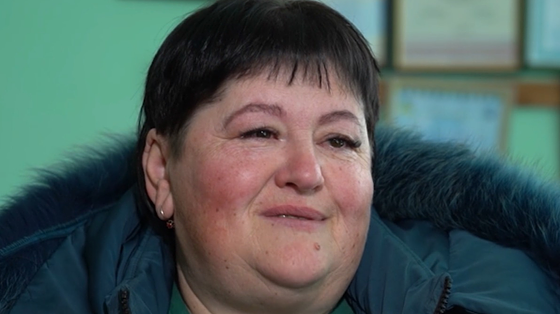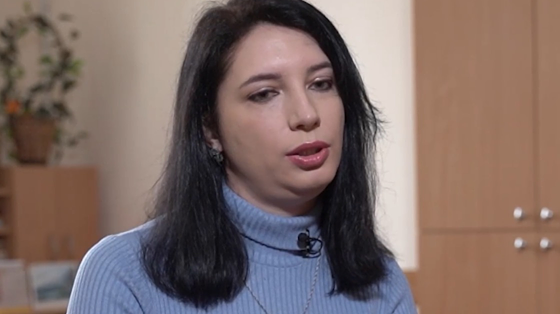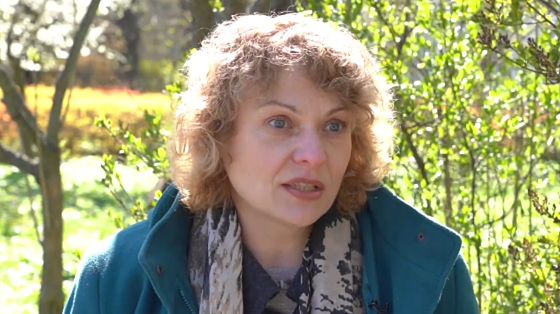In the first week, while there was still a telephone signal, Oleksandr, a Paralympian, world champion and European champion in swimming, tried to help people. He went to the wholesale market, bought some food and delivered it to bomb shelters.
He stayed in the house until 6 March. At night, he heard the roaring of an airplane and saw two flashes and two explosions. He found out that missiles hit Port City and Azovskyi market. From 6 March, planes started flying and dropping bombs every day. At first, only at night-time, but then during the daytime too. Two missiles struck Oleksandr’s house. The house burned down in 20 minutes.
On 10 March, a bomb fell not far from the house. His neighbour and neighbour’s grandmother were under the rubble when the building collapsed. She died under the rubble, but the guy was taken out. The next day, the plane dropped the bomb again...
On 24 February, my wife and I slept at home, in our flat. In the morning, at around 6 o’clock in the morning, my wife woke me up and said that everything started. A friend called her and said that Ukraine was attacked and the war began. We woke up right away and started calling our parents, our friends and acquaintances. We watched the news and read all kinds of social media channels and social networks. Well, we learned that there were explosions throughout Ukraine and that russian troops invaded our territory. Well, we were completely immersed in the news for about half a day and began to think what to do next.
That night we still stayed at home in our flat, and the next morning we decided to go to my parents’ private house, in Parkovyi village. On the first day, on 24 February...
We live near a fuel station and we saw through the window very long queues gathering at the fuel station.
So we did not go to re-fuel the car. The next day, when we were going to my parents, we just drove off and there was no one at the fuel station. We thought there was no gasoline, but the price table/tag for gasoline was still hanging, and so we stopped by to find out if there was any fuel. There was only diesel fuel on sale and we have a diesel car, so we filled up a full tank and drove to my parents. We took the minimum amount of things with us. We took two backpacks and all the food that we had at home. My sister also came over to our parents, and from 25 February, we stayed in Parkovyi village all the time, in our parents’ house. The central district of the city was not shelled yet. Everything started with Skhidnyi district, and we followed it closely in the news. Well, we were not going to leave. We thought that the attack would end maybe in a week or a few days, that it was just an escalation. However, day after day, the situation changed and became hotter and hotter. The Left Bank and Cheremushky districts were bombed. Power supply was cut off, and naturally, the Internet disappeared. That is, we became...
We were cut off from electricity and from the news. Then water supply stopped too. On 6 March, gas supply was turned off and we found ourselves in the Stone Age, so to speak. In the first week, while telephone/Internet connection was still available, Dmytro Zabavin and I tried to help both residents of Sartana village, who were evacuated to the city centre, and those people who moved from the Left Bank. We went to the wholesale market, bought some food, and Dmytro Zabavin delivered it to the bomb shelters, but when we lost the telephone connection and contact with everyone, I stopped going anywhere.
We stayed at home. We can say that we were lucky with the weather, since there was rain and snow. We were able to keep some water in stock.
Since we lived in a private house, we had... even during peaceful time, we filled the tanks with rainwater. We made good reserves of rainwater, and basically, we cooked food on the fire in the yard. This is what our father was busy with. He was outside almost the whole day, cooking breakfast, then lunch, and then dinner. He kept hot water for tea all the time. Well, basically, this is how we lived from the beginning... until 6 March. Everyone slept in his or her own place, so to speak, and then on 6 March, or on the night of 5 to 6 March, we went to bed and heard the roaring of a plane. Then we saw two flashes through the window, followed by two explosions. And the next day we learned from our neighbours, who lived in the 23rd micro-district, that missiles hit Port City and Azovskyi market.
Starting from 6 March, planes began to fly, drop bombs and launch missiles every day. Well, at first, it seemed to be only at night-time, but some four or five days later, they were flying during the daytime too. That is, planes began to fly and drop bombs almost around the clock. On 10 March, a bomb fell some 30-40 meters from our house and my neighbour, my friend, and his grandmother were covered by the rubble. Well, other neighbours ran up. They were hiding in the cellar of their private house, and they then dug out and pulled out my neighbour, but his grandmother died under the rubble. She remained there.
Then the plane hit the next street. It was not more than a hundred metres from us, perhaps. After that strike, some people, our neighbours, died too. At night, a bomb landed some 300 meters away from us. It left a five-metre pit... A crater five metres deep.
There had been a two-storey house there, but there was nothing left of the house at all. A pit was in the place of the house. We all gathered in one room, central one, so that we could be protected from all sides. And we did not go to the basement, so as not to be buried there if everything collapsed, like it happened to our neighbours.
We set up some... We placed some metal sheets around the house to protect the windows and prevent any shell fragments from flying inside through the windows. We blocked the windows with pillows and blankets... We all slept on the floor under a heavy table, at least to be somehow protected by that table if shall fragments fly in. We all lived in one room, all five of us, and sometimes six. We all slept on the floor, under the table. We lay close to each other, tightly dressed and under three blankets. Well, in the first week, we managed to stock up on food and water because the wholesale market was near us. We bought some potatoes there. Basically, we had some small stocks of pasta and cereals. Well, we mostly ate unpeeled boiled potatoes because it took us a lot of time to boil the water [to cook anything else] and we did not always even boil it. We drank hot tea, sometimes several times, because we had many containers with water...
We drank tea made from rainwater. Well, basically, we almost did not go out of the house. Only my father cooked, while we lay and stayed in the house all days long.
We almost did not want to eat. One or two potatoes once or twice a day was enough for us. That’s about our meals.
We also had some vitamins to avoid strong avitaminosis. So we were taking those vitamins. All our neighbours tried to get some news. They were looking for a telephone signal or Internet connection, or tried to catch a radio signal... And some information began to appear, information that “green corridors” should be announced. We made the first attempt on 7 March. A convoy of vehicles began to gather near the Drama Theatre. We did not really take many things with us. My father said that he would not leave. So we, my wife, my sister, my mother, my nephew and myself, got into the car, took one backpack each and drove to the Drama Theatre, but after standing there for half an hour, we learned that no evacuation was planned and nothing would happen.
We then returned home, and from 6 to 16 March, planes flew non-stop for 10 days. Maybe those were some heavy weapons... For ten days, Parkovyi village and Novoselivka were hit by missiles, bombs and shells non-stop.
On 16 March, at 4 or 6 o’clock in the morning, we heard a loud explosion somewhere nearby. My father went outside and then he came back to the house and said that our outbuildings in the yard were swept off, while we remained lying in the room.
Half an hour later, around 20 shells landed one after another, very close to us. About 20 shells landed in 10 seconds, very hard, very loudly. Then there was a short pause and we thought that we should move somewhere and decided to go to the bomb shelters. We heard from our neighbours that there were still some places in the bomb shelters in Stalin-era buildings located somewhere near the Drama Theatre.
We began to pack up our things to go there and at 8 o’clock in the morning, my neighbour came and said that a “green corridor” for leaving was opened and that he was going to leave in 10 minutes. Well, we then decided not to go to the bomb shelter, but to try to leave too. We packed up in half an hour and at 9 o’clock in the morning, we drove off in the direction of Melekine. Before we left, we were told that russian tanks had passed along Myru Avenue. Well, we were driving carefully, and on Nakhimova Avenue, after Ilyichevets, after Komsomol Square, we met some cars that were going towards the port.
And at Strelka road crossing near the port, we joined a convoy of cars. So we proceeded to the exit from the city, to Melekine. Our destroyed checkpoint was there. Then we reached the turn to Portovske and came to Mangush. There was a checkpoint there. We joined the queue at the checkpoint and were standing and waiting there...
That morning explosion... Shell fragments pierced the garage door and broke the rear window in the car. They left some cuts on the car body too.
So the five of us left, but my dad remained at home. By midnight, we came to Berdiansk. While we passed through all the checkpoints, at 18 o’clock, we were only a kilometre from Berdiansk, but there they [the invaders] decided to make another checkpoint – so it took us five or six hours to make that one kilometre to enter Berdiansk.
Upon arrival in Berdiansk, we again began to read the news, as we now had at least some kind of telephone/Internet connection. We contacted our relatives and found out that the russians dropped a bomb on the Drama Theatre, while earlier we had just planned to go to the bomb shelter either near the Drama Theatre, or to the Drama Theatre. The next day, at 7 o’clock in the morning, we left for Zaporizhzhia and we were in Zaporizhzhia at around 16 or 17 o’clock. We did not have any contact with my dad for a long time, for about two weeks. And then we found out that on 17 March, that is, the day after we left, two missiles hit our house and it burned down in 20 minutes. That is, if we had stayed one more day, we would all have died.
The missile struck right in the central room where we all had stayed earlier, while my dad was in the outer room and he managed to get out of the burning house. The house was already on fire and our neighbours helped him to get out.
I believe that we will win and will be able to return all our territories.







.png)



